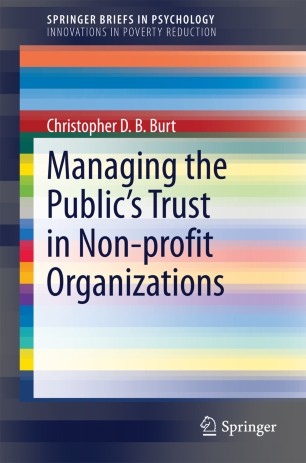Managing the Public’s Trust in Non-profit Organizations
Globally there is growing concern over charities’ abilities to raise funds. This is of concern to both charity organisations and policy makers.
One of the key factors that determine the public’s willingness to provide funds (to donate) is trust in both specific charity organisations and the sector in general. A significant amount of research from a number of disciplines has pointed to ways in which the public’s trust can be generated and maintained.
Bringing this research into a single source will provide a valuable guide for both individual charity organisations and policy makers.
Managing the Public’s Trust in Non-Profit Organisations analyses the intricate psychological processes behind trust and philanthropy and applies this knowledge to best-practice guidelines for nonprofits.
This monograph explores cognitive, affective, societal, and other contexts for trust, and how these influence giving in the short and long term. On the practical level, chapters offer new research-based methods of assessing and gauging donor trust, and a real-world framework for building trust with donors, communities, and the public at large.
These organisation-level ideas are also related to larger policy initiatives such as the Millennium Development Goals.
Among the book’s core topics are:
- The role of trust in donating money.
- Understanding and measuring donors’ trust in a charity.
- Improving charity efficiency and accountability in building trust.
- Communicating effectively with donors.
- Dealing with violations of trust.
- The future of charities and nonprofit organisations, especially in the digital age.
Springer Briefs in Psychology / Springer Briefs in Innovations in Poverty Reduction
Buy on Bookshop.org Buy on Amazon



